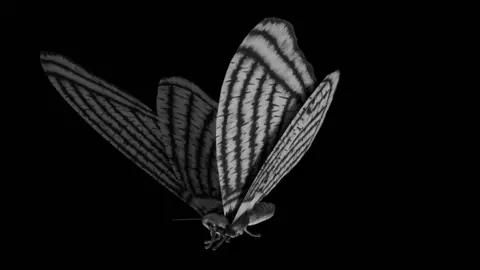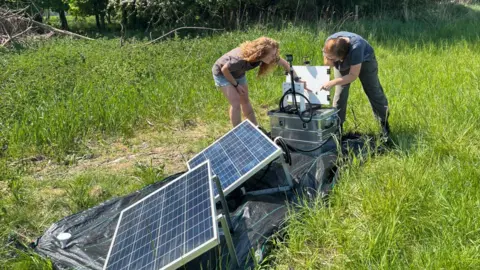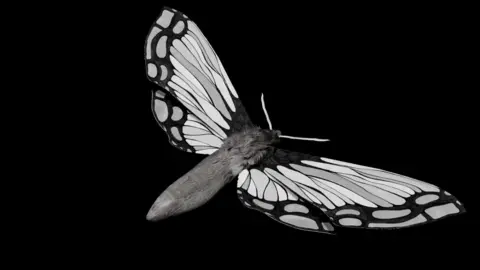Nature reserve's moths help composer make new music
 The Northern School of Arts
The Northern School of ArtsMusic that explores declining biodiversity has been created using the activity of 80 species of moth during an evening at a nature reserve.
Scientists at the UK Centre for Ecology and Hydrology collected data on the moths at Parsonage Down Nature Reserve, near Salisbury, in Wiltshire, and shared it with professional musician Ellie Wilson.
"I assigned sounds to the individual species of moth," explained Ms Wilson, from London. "As that moth appeared that evening, you hear a sound."
Premieres of the 12-minute piece, called Moth x Human and which is played alongside live musicians, will be held at the Southbank Centre and at the Bradford City of Culture 2025.
The four-hour recording at Parsonage Down in August detected a variety of different moth species, including elephant hawk, burnished brass, water veneer and ruby tiger moths.
Ms Wilson said the data was put through a computer and she attached sounds to the movement of each species and "pressed play".
"It's the ebb and flow of their activity that night," she explained, rather than the literal sound of moths, which are usually very quiet.
"It's like a chat between moths and humans."
 UK Centre for Ecology and Hydrology
UK Centre for Ecology and HydrologyWhile Ms Wilson, who is a classically trained composer violinist, admitted it was out of her "comfort zone", she said she wanted to explore biodiversity and the idea to use the insect activity came to her at breakfast one morning.
Ms Wilson was then commissioned for the project by the Oxford Contemporary Music charity.
"The message I'm trying to get across in the music is a celebration of moths," Ms Wilson told the BBC, adding they are important pollinators but are often "forgotten".
 The Northern School of Arts
The Northern School of ArtsShe worked with the UK Centre for Ecology and Hydrology to get the data.
"Scientists have automated moth activity systems," she said. "They put them out on different locations to analyse the land.
"They have cameras on them - so every time a moth is attracted to the light, the camera takes a picture and they use artificial intelligence (AI) to identify the species."
In contrast to the 80 species at the Wiltshire nature reserve, Ms Wilson said data shared with her from farmland where pesticides had been used only detected 19 species of moth.
Stuart Hales, from Natural England, which owns the Parsonage Down reserve, said: "National nature reserves are our most important places for nature, so it's exciting to see Parsonage Down providing inspiration for the arts, in addition to being crucial for conservation."
The piece will have its first airing in Bradford on 7 June and then will also be played at the Southbank Centre in London on 5 July, as part of a New Music Biennial from the PRS Foundation, which is a free festival.
Follow BBC Wiltshire on Facebook, X and Instagram. Send your story ideas to us on email or via WhatsApp on 0800 313 4630.
